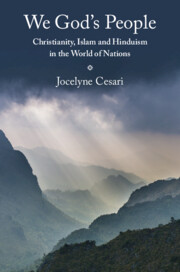‘In We God's People, Joceleyne Cesari demonstrates the diffusion of the Western concept of the nation-state across the world brought with it the Western concept of religion which, in turn, profoundly influences religious politics across the world. This seemingly simple insight is profound and complex in its application and Cesari masterfully takes us through this process in multiple settings. It is an unprecedented tour de force based on interdisciplinary and historical original research that provides groundbreaking insights on the new theoretical and methodological approaches on religion, politics and secularism. Once again her insights cause me to see much of what I thought I knew about religion and politics, secularism in a new light.'
Jonathan Fox - The Yehuda Avner Professor of Religion and Politics, Bar Ilan University
‘Jocelyne Cesari's far-ranging book is marked by a unique combination of theoretical acuity and empirical range. This is scholarship at its best, brought to bear on a central aspect of world politics.'
Peter J. Katzenstein - Walter S. Carpenter, Jr. Professor of International Studies, Cornell University
‘Built upon the simple but powerful notion that the global expansion of the modern nation-state beyond the West went hand in hand with the global expansion of the Western secular/religious divide, Cesari’s book expands her analysis of political Islam to offer a rich comparative overview of the way in which these processes unfolded, similarly yet diversely, in India, China and Russia.’
José Casanova - Emeritus Professor of Sociology, Georgetown University
‘This is an incredibly rich account of the connection between the spread of the nation-form and the religious-secular divide in a number of contexts: Syria, Turkey, Russia, India, and China. It provides an astute perspective to understanding our contemporary world for anyone interested in an ambitious sociology of religion that takes both historical and sociological data seriously.’
Peter van der Veer - Director, Max Planck Institute for the Study of Religious and Ethnic Diversity, and author of The Modern Spirit of Asia
‘Much has been written on how colonization altered the nature of organized public power on the one hand and the character of organized faith on the other. Yet scholarly work on how precisely it impacted their relationship outside the west is scarce. I can think of no better scholar than Jocelyne Cesari to fill this gap. In this well-researched and insightful book, Cesari argues that as the international system developed in the West expanded forcing other societies to structures their memories, emotions and values in accordance with the 'national framework', it pushed them to adopt the separtionalst paradigm with all the tensions between power and faith it engenders. An important book that is bound to become a landmark in the relationship between the 'west' and the 'non-west' on political secularism.’
Rajeev Bhargava - Director of Parekh Institute of Indian Thought, Centre for the Study of Developing Societies, Delhi





